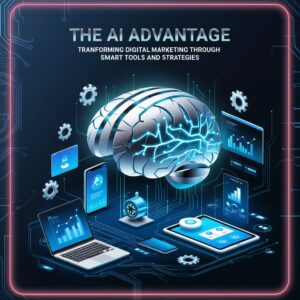
The AI Advantage: Transforming Digital Marketing Through Smart Tools and Strategies
In today’s fast-paced digital world, staying ahead of the competition requires more than just creativity—it demands intelligence. Artificial Intelligence (AI) is reshaping the landscape of digital marketing by offering smarter tools, data-driven strategies, and personalised customer experiences. From automating repetitive tasks to delivering hyper-targeted content, AI is not just a trend—it’s a game-changer.
What is AI in Digital Marketing?
AI in digital marketing refers to the use of machine learning algorithms, natural language processing, and data analytics to enhance marketing efforts. It enables marketers to understand consumer behaviour, predict future trends, automate tasks, and create more impactful campaigns—all in real time.
Key Areas Where AI is Making an Impact
1. Personalisation at Scale
AI enables marketers to deliver personalised content, product recommendations, and email campaigns to millions of users simultaneously. Tools like Dynamic Yield and Adobe Target analyse user data to tailor messaging, improving engagement and conversions.
2. Chatbots and Conversational AI
Chatbots powered by AI can handle customer service queries 24/7, respond instantly, and even guide users through the sales funnel. Platforms like Drift and Intercom have made it easier to engage with leads in real time while saving human resources.
3. Predictive Analytics
AI uses data modelling to predict future consumer actions. With tools like HubSpot and Salesforce Einstein, marketers can forecast campaign outcomes, customer lifetime value, and churn rates—enabling smarter decision-making.
4. Content Creation and Curation
AI writing tools like ChatGPT and Jasper help generate blog posts, ad copy, and social media content. AI can also curate content based on audience preferences, ensuring relevance and higher engagement.
5. Programmatic Advertising
AI automates the buying of ads, targeting the right audience at the right time with the right message. This real-time bidding system reduces cost-per-click (CPC) and increases ROI through efficient media buying.
6. Visual Recognition and Targeting
Platforms like Google Vision and Meta’s ad tools use image recognition to analyse visual content, helping brands target users based on the imagery they engage with—especially useful for fashion, food, and lifestyle brands.
Real-World Examples
-
- Spotify uses AI to create personalised playlists like Discover Weekly by analysing listening behaviour.
-
- Amazon recommends products using AI-driven collaborative filtering based on user preferences and purchase history.
-
- Sephora uses a chatbot powered by AI to offer makeup tips and product suggestions, boosting online sales.
Challenges to Consider
While AI offers immense benefits, it’s not without challenges:
-
- Data privacy concerns require careful handling of user information.
-
- Over-reliance on automation may weaken human creativity and emotional connection.
-
- High initial setup costs for advanced AI tools might be a barrier for small businesses.
The Future of AI in Digital Marketing
AI will continue to evolve, with advancements in voice search, augmented reality, and hyper-personalisation. As AI becomes more accessible and powerful, marketers who adopt it early will have a competitive edge in delivering smarter, faster, and more meaningful campaigns.
Final Thoughts
AI is no longer a futuristic concept—it’s a current necessity for any digital marketing strategy. By leveraging the power of AI, marketers can move from reactive to proactive strategies, optimise performance, and deliver exceptional customer experiences. The AI advantage is clear: smarter marketing, better results.